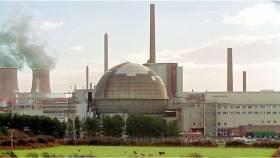Displaying items by tag: Sellafield
British Government Warned to 'Get a Grip' on Irish Sea Nuclear Site
BBC News reports that The UK government must "get a grip" on spiralling costs and project delays that have plagued the Sellafield nuclear site, located on the far side of the Irish Sea on the Cumbrian coast, approximately 170 km (112 miles) from the northeast coast of Ireland, just 128 miles from Dublin.
The UK's Public Accounts Committee (PAC) said in a report that some decommissioning projects had already been delayed by more than a decade.
It said estimated budget overruns had climbed to nearly £1bn.
The complex in Cumbria includes three old experimental nuclear reactors, four shut down nuclear power plants and thousands of tonnes of radioactive fuel and high-level wastes.
Sellafield is home to 40% of the world's stock of plutonium which is used to make nuclear bombs.
The committee expressed concerns about the government's lack of clarity over what to do with the stockpile.
MPs acknowledged that progress had been made in reducing risk and removing waste.
However, they said the Nuclear Decommissioning Authority, which is responsible for winding down and cleaning up the site in Cumbria, had not reviewed why projects kept running into difficulties.
Sir Geoffrey Clifton-Brown, deputy chairman of the PAC, said that the Department for Business, Energy and Industrial Strategy "needs to seriously get a grip on its oversight of nuclear decommissioning in this country".
Rising Seas Pose Future Leak Threat To Sellafield Dump
#IrishSea - One million cubic metres of radioactive waste at a dump site near Sellafield is at risk of contaminating the Irish Sea in the future, according to papers released by Britain's Environment Agency.
According to The Guardian, the internal report says it is "doubtful" whether the location of the Drigg Low-Level Waste Repository (LLWR) on the Cumbrian coast "would be chosen for a new facility for near-surface radioactive waste disposal if the choice were being made now."
Though the full effects of coastal erosion, weathering and flooding are not expected to be felt until "a few hundred to a few thousand years from now", the agency has expressed worry over the site's gradual exposure to the elements.
This is compounded by fears that past deposits at the site over the last 55 years have included higher-level radioactive waste than intended.
The Guardian has more on the story HERE.
UK Watchdog Slams Sellafield Nuclear Waste Handling
#SELLAFIELD - Radioactive waste stored at Sellafield poses an "intolerable risk" to the environment, according to the UK's National Audit Office.
RTÉ News reports that a new study from the British government department watchdog highlights the failure of successive operators of the UK's largest nuclear plant to properly dispose of waste from the facility over more than 50 years.
The complex, on the coast of the Irish Sea in Cumbria, is said to contain enough contaminated waste to fill 27 Olympic-sized swimming pools.



























































